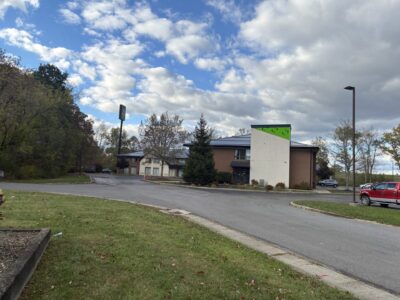First Wave Of Tree Of Heaven Herbicide Treatment Completed
- Twan Leenders and his team have completed the first round of herbicide treatments on the “invasive” tree of heaven plants along the city’s Chadakoin River. Pictured is Mikael Catanese from Arbor Wild Environmental injecting the herbicide into the tree of heaven plants using a “hypo-hatchet” that affects only the tree of heaven and specifically targets the root system. Submitted photos
- Twan Leenders and his team have completed the first round of herbicide treatments on the “invasive” tree of heaven plants along the city’s Chadakoin River. Pictured is Mikael Catanese from Arbor Wild Environmental injecting the herbicide into the tree of heaven plants using a “hypo-hatchet” that affects only the tree of heaven and specifically targets the root system. Submitted photos
- Twan Leenders and his team have completed the first round of herbicide treatments on the “invasive” tree of heaven plants along the city’s Chadakoin River. Pictured is Mikael Catanese from Arbor Wild Environmental injecting the herbicide into the tree of heaven plants using a “hypo-hatchet” that affects only the tree of heaven and specifically targets the root system. Submitted photos

Twan Leenders and his team have completed the first round of herbicide treatments on the “invasive” tree of heaven plants along the city’s Chadakoin River. Pictured is Mikael Catanese from Arbor Wild Environmental injecting the herbicide into the tree of heaven plants using a “hypo-hatchet” that affects only the tree of heaven and specifically targets the root system. Submitted photos
While the threat of the spotted lanternfly has been growing in recent months, local experts hope to mitigate the threat by removing the tree of heaven plants along the city’s banks of the Chadakoin River.
Twan Leenders, Chautauqua Watershed Conservancy ecological restoration manager announced the completion of the first phase of herbicide treatments this week.
“I’m happy to report that we just finished treatments,” he said. “We’ve been weighing our different options and different chemicals and different uses and really wanted to make sure that all the trees are treated before the leaves come off. Treatment has to be completed before 50% of the tree of heaven’s leaves have dropped.”
Despite initially planning to treat the trees with herbicides during the summer months, Leenders said his original time frame was not “feasible.” Leenders had intended to treat the tree of heaven prior to the plants dropping another year’s worth of seeds; however, he said the issue will require re-treatment next year anyways, due to decades of invasive growth.
“The next best time to treat these trees is really right now,” he said. “This is the time of year where all of our trees are actually drawing all of their unused resources and using reusable resources out of their leaves and store them into their roots.”

Twan Leenders and his team have completed the first round of herbicide treatments on the “invasive” tree of heaven plants along the city’s Chadakoin River. Pictured is Mikael Catanese from Arbor Wild Environmental injecting the herbicide into the tree of heaven plants using a “hypo-hatchet” that affects only the tree of heaven and specifically targets the root system. Submitted photos
As the trees transport chlorophyll reserves into the root systems, Leenders said it presents the best opportunity to treat the trees with chemicals.
“All of the chemicals inside the trees is directed downwards towards the roots,” he said.
“Injecting herbicides into the trunks of these trees right now will ensure that most of this will get immediately put into the root system, and that’s essentially what we’re trying to accomplish with the trees, to kill the root system.”
Leenders explained that once the tree of heaven’s root systems are fully saturated with the herbicide treatment and killed, his team can begin to remove the above-ground plants. He warned that if the root systems are not taken out first, the trees can continue to reproduce at a rapid rate.
After initially estimating about 1,200 tree of heaven plants along the city’s Chadakoin River banks, Leenders said the final treatment count was between 3,000 and 3,500 trees. He estimates that about 95% of the tree of heaven plants were treated. The remaining trees requiring treatment will need to be approved by the railroad, which owns a section of the property, in order to complete the removal of the tree of heaven along the Chadakoin River.

Twan Leenders and his team have completed the first round of herbicide treatments on the “invasive” tree of heaven plants along the city’s Chadakoin River. Pictured is Mikael Catanese from Arbor Wild Environmental injecting the herbicide into the tree of heaven plants using a “hypo-hatchet” that affects only the tree of heaven and specifically targets the root system. Submitted photos
Asked whether the treatment has been successful, Leenders said the herbicides take time, especially with the more mature trees.
“This treatment takes a while to really take effect because it takes time to have it spread throughout the entire system of roots and to really have an impact,” he said.
Nevertheless, Leenders said he observed signs of the tree of heaven plants losing their leaves prior to the time they would normally change color and fall, indicating that the herbicide treatment could already be working.
Regardless of the success of this year’s treatment, Leenders said the city will need to continue herbicide treatments for several years.
“Treatment is never 100%, so there will be a need to retreat trees that did not die right away,” he said. “There will hopefully be far fewer than this time around. There will be a need to continue treating for another several years because we do have a seed bank and we do have additional young trees that will continue to come up.”
Leenders said the multi-year treatment plan is part of a “larger scale integrated management plan” that he hopes to receive additional funding for.
The Chautauqua Watershed Conservancy, the Chautauqua County Soil and Water Conservation District and other partner organizations have worked together to submit a water quality improvement grant application through the state that would provide the funding required for the project to be sustained over an extended period of time.
“My hope is that all these other follow up efforts that need to happen over the next five years will really see this project through from the beginning to the end to make sure that the effects are truly lasting and sustainable,” Leenders said. “We’re hopeful that by the end of this calendar year the grant is awarded.”
If the grant is fully awarded, the funding would cover several years of retreatments, continued removal of other invasive plant species, the replanting of areas along the river where invasives will be removed, the replanting of new trees, and several shoreline stabilization projects.
“The projects is getting bigger and the impact is getting bigger and it’s moving really fast,” Leenders said. “I’m really excited for all the support we’ve had so far and keeping my fingers crossed that the grant will come through at the end of this year.”
While Leenders acknowledged that it is unlikely the city will be able to completely prevent the spotted lanternfly from migrating to the area, he is hopeful that by removing its preferred host species, the tree of heaven, the population can be managed to avoid widespread issues.







